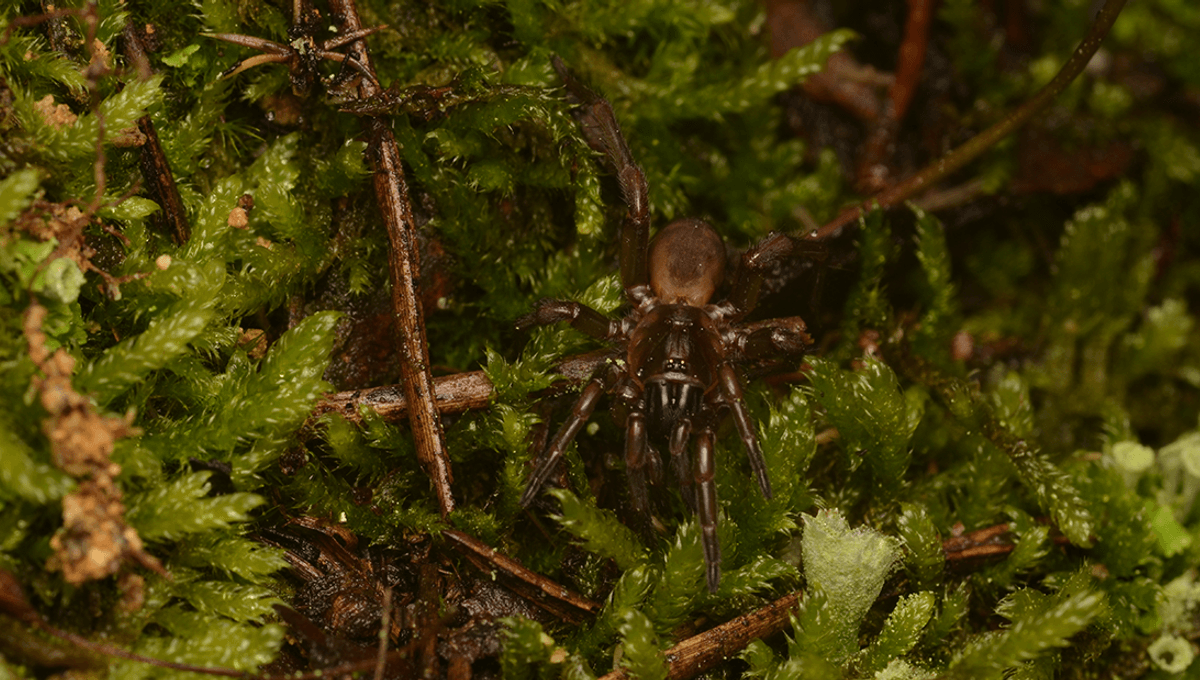
Rediscovering previously lost to science species is becoming a bit of a hot topic at the moment and shows no sign of slowing down. After the rediscovery of Attenborough’s long-beaked echidna, the team at Re:wild’s Search for Lost Species project are at it again, and this time they’ve found a tap-dancing spider in Portugal.
The Fagilde’s trapdoor spider (Nemesia berlandi) is endemic to Portugal and was first described in 1931 by the pioneering female entomologist, Amélia Bacelar. Bacelar was only able to research female spiders in the species, and the only known examples of the species burned down in a museum fire in 1978. No biologist has ever seen a male member of the species and no one has seen either a male or a female in 92 years.
“Fagilde’s trapdoor spider is the only species endemic to mainland Portugal that hasn’t had a documented sighting for nearly a century or longer,” Sérgio Henriques, invertebrate conservation coordinator at the Global Center for Species Survival at the Indianapolis Zoo and the leader of the expedition that rediscovered the spider, said in a statement sent to IFLScience.
The team began their search in the forests around the village of Fagilde between August 2021 and November 2023. This particular trapdoor spider lives in horizontal burrows under the leaf litter, rather than the more typical vertical burrows found in other trapdoor species.
The team built artificial spider-hiding spots in the hope of enticing the males of the species into them during their trips outside of their burrows to look for mates. The tap dancing nickname comes in because, to breed, the male spiders will carefully drum or tap dance with their legs on the door to the female’s burrow, if she is pleased with his performance, the trapdoor will open and the pair will mate.
Eventually, the team’s persistence began to pay off. In 2021, they found a trapdoor spider burrow 10 centimeters (4 inches) long and with a trapdoor that was 2.5 centimeters (0.9 inches) across. Trapdoor spiders can stay within their burrows for years, only leaving to find prey and to breed, making locating this species especially difficult.
Henriques found a spider burrow and carefully excavated the sides to reveal a female trapdoor spider with the extra surprise of 10 spider babies inside. The spider was found in the same area as the original was found by Bacelar in 1931 and had the same unique pattern as she described 92 years ago.
To confirm their suspicions that this was a Fagilde’s trapdoor spider, the team needed to test the spider’s DNA. Fortunately, trapdoor spiders have a nifty ability to regrow their legs, which they detach from their bodies as a defense against predators. The team was able to preserve the leg in ethanol, before sending it for DNA testing.
The results revealed that the spider found by Henriques inside the burrow was not a genetic match for any other known spider species in the area and thus was the long-lost Fagilde’s trapdoor spider they had been looking for.
“This is the first rediscovery for the Search for Lost Species in Europe, and it’s a good reminder of just how incredible and unique invertebrates – who make up 97 percent of animal species on the planet – are,” said Christina Biggs, lost species officer for Re:wild.
Now that the species has been rediscovered, questions have turned to the species’ future. Unfortunately, the area has become increasingly prone to wildfires due to climate change. To help protect the spiders, Henriques has engaged the local community, who report spider sightings in the area and a local bakery even makes cupcakes that celebrate the spider. The increase in community involvement has even revealed a totally new-to-science species in a nearby area.
“Everything about this species delightfully defies what we usually expect of trapdoor spiders and it makes me hopeful for other overlooked species,” finished Biggs.
Source Link: Tap Dancing Spider Lost To Science For 92 Years Rediscovered In Portugal